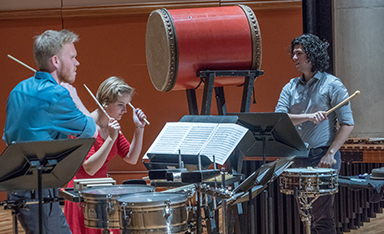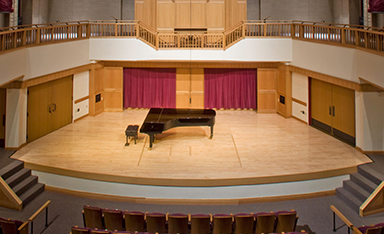The Minor in Music offers students the opportunity to pursue advanced musical study alongside a non-music major. Open to all DU students by audition, this program is ideal for those with prior musical training who wish to continue developing their skills in a focused and supportive environment.
The curriculum consists of 23 credits and can be completed in two years. Students receive individual instruction through applied lessons on their primary instrument while building a strong foundation in music theory, aural skills, and musicology. This well-rounded program balances performance and academic study, fostering both technical growth and artistic insight.
Whether you're preparing for a career in any field, planning to audition for graduate study, or simply committed to keeping music an active part of your life, Lamont’s music minor is an excellent fit for students who are passionate about music and ready to engage with it at a high level while pursuing a broader academic path.
Students who would like to be considered for a music minor should contact the Lamont Office of Admission to schedule an audition.
Minor Requirements
Students pursuing the minor take 30-minute (2 credit) lessons each week and participate in ensembles on their primary instrument. They take eight credits of music theory/aural skills and six credits of MUAC 2000-level musicology courses. The music minor consists of 23 credits and can be completed in 2 years.
For more information see the Undergraduate Bulletin.
Admission Requirements
An ideal music minor for the Lamont School of Music has previous experience on their primary instrument. If you would like to be considered for the minor in music, please contact the Lamont Office of Admission at musicadmission@du.edu to schedule your audition. Auditions are held year-round.
Featured Courses
MUAC 2057
Intro to World Musics
About this Course
This course is designed as an introduction to select world music traditions and to ethnomusicology, a discipline many define as the study of music in culture. We focus on three world areas: North India, Brazil, and Senegal. For each of these units, we examine various genres and musical systems and explore music's connection to ritual, belief, aesthetic ideals, politics, and social organization, asking what makes music meaningful for practitioners and audiences. Lectures and discussions are supplemented by regular guest lecture-demonstrations, films and hands-on workshops. Because students interpret the musical works as they represent the ideas and artifacts of human culture and analyze the connections between these and varied human experiences and perceptions of the world, this course may be used to partially fulfill the general education requirement Analytical Inquiry: Society and Culture. Prerequisite for music majors: MUAC 2051.
MUAC 2055
Musicology: Romantic Music
About this Course
Through the study of selected vocal and instrumental works, this course explores the musical style, performance practice issues and the historical context of Western European music from c. 1830 to c. 1890. Scores, recordings, primary sources and secondary sources accompany the textbook. Because students interpret the musical works as they represent the ideas and artifacts of human culture and analyze the connections between these and varied human experiences and perceptions of the world, this course may be used to partially fulfill the general education requirement Analytical Inquiry: Society and Culture. Prerequisite for music majors: MUAC 2051.
MUAC 1001
Music Theory I
About this Course
The Fall quarter of Theory I covers fundamentals (key signatures, triads, seventh chords rhythm and meter, etc.) and first-species counterpoint, in both creative and analytic contexts. Although some entering students may be familiar with these concepts, the course emphasizes speed and mastery.




